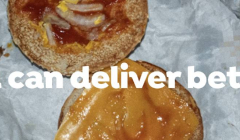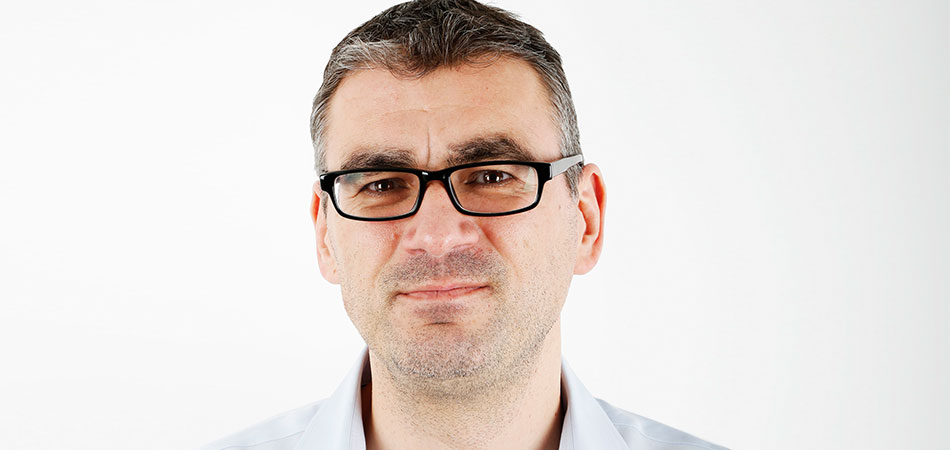
Knorr spotlights fast food fails to deliver better
The campaign from MullenLowe highlights that home made food can be better than takeaways.
Managing Director, HeyHuman


Career to date:
2008, Managing Director and Partner, HeyHuman and Closer
2003, Strategic Director, The Farm
2000, Lead Managing Partner, RAPP
1997, Board Account Director, RKCR/Y&R
1995, Associate Director, DMB&B
1993, Account Director, Ammirati Puris Lintas
1990, Senior Information Officer, UK Department of Health
Neil Davidson: My focus is building an agency that’s right for now and for the future and making it an agency that people want to be part of. Agencies have been too slow to change, we’ve spent the last three years fixing this but it’s a constant challenge. It’s my key focus and also what makes people proud to be part of what we’re trying to make happen.
Neil Davidson: I began my career advising Government Ministers on communications strategies for HIV/AIDs and drug misuse, which stirred my desire to work in advertising. I’ve worked in big agencies such as RKCR/Y&R and worked around the world. Highlights for me were doing great work on big creative campaigns that get people talking – Ford Puma, the Royal Marines and Carling. Running an independent agency was driven by a desire to change the model.
“There’s still plenty to do to break down the silos – between agencies and clients and between client services, planning and creative. Everyone has a role in getting to the best ideas in this age of start-ups where collaboration is key. Why would I want to work in a creative industry but be told to stay in my box and know my place?”
Neil Davidson: We’ve spent three years building our way of thinking and way of working, making behavioural economics and neuroscience accessible, which is not an easy job. We’ve built an approach that brings clients and agencies together at the start and throughout, again, because the old linear model doesn’t work. I joined because it was a successful agency but following a generic marketing model at the time that needed to change.
Neil Davidson: We have our stars in HeyHuman, and the ones who have constantly impressed me this year have embraced our new way of working and built on it with enthusiasm and intelligence. Change is always difficult and I really admire our people who have ran with the HeyHuman way in a way that’s been infectious with clients.
Neil Davidson: We have been fortunate enough to have worked with some great clients this year, like Sony, Mondelez and Diageo. Our most recent work for Guinness in Africa not only performed amazingly well, but changed our ways of working with Guinness to think ‘bottle out’. You can see the full case study here.
Neil Davidson: I’m not sure if ‘excited’ describes it but the Budweiser anti Craft beer ad was pretty gob-smacking. Love it or hate it you couldn’t say that it didn’t take a position and pitch it without fear. It made me laugh, a lot.
Neil Davidson: I’m a bit of a reader when I get the time so it’d be easy to trot out a list of clever authors but to be honest I’m much more inspired by my son. He keeps me grounded, keeps me thinking and makes me laugh.
Neil Davidson: I maybe don’t as much as I’d like to but to be honest I’ve always been more motivated by being curious about the world and the people in it. We all need to know the industry, but it’s also healthy to keep your feet in the real world.
Neil Davidson: I still admire the work coming out of Droga5 generally.
Neil Davidson: Easy: changing to reflect the realities of how you need to work to connect with people whilst doing the day job. As an industry we haven’t done enough or soon enough. We also need to sort out smarter payment models, or it’s a race to the bottom.
Neil Davidson: More unbundling, more channels, more content will demand us to think smarter about delivering content that people want to share. Easy to say, but this will demand smarter and more fluid customer journeys.
“In this disconnected world brands need to behave in more human ways to actually connect – listen more, show more empathy and speak clearly, putting people before brands. Many brands have lost their way when it comes to this.”
Neil Davidson: I’m good with the traditional pitch – proper briefs, intelligent discussions and good feedback. I mourn the loss of this, based on a few experiences we’ve had this year. An opportunity to impress, a level playing field and a good reward at the end of it. Bring it all back.
Neil Davidson: Probably a pitch on Ford way back in the day, a massive multi-million pound way that took the bulk of the business away from the incumbent. It took the best part of the year and was a bit of a rollercoaster ride but obviously worth it, and great work at the end of it.
“I’ve always been more motivated by being curious about the world and the people in it. We all need to know the industry, but it’s also healthy to keep your feet in the real world.”
Neil Davidson: There’s still plenty to do to break down the silos – between agencies and clients and between client services, planning and creative. Everyone has a role in getting to the best ideas in this age of start-ups where collaboration is key. Why would I want to work in a creative industry but be told to stay in my box and know my place?
Neil Davidson: A big famous idea that comes out from our ‘brain-friendly’ creative approach – we’ve been working hard on making neuroscience meaningful for our creative teams and looking forward to seeing it make a difference in the work.
With increasing pressure on governments, do you think brands have a responsibility to step in and help local communities? How are you working with brands to help implement social good at a local level?
We talk about brands behaving as ‘human brands’ as the opportunity for brands in the future. In this disconnected world brands need to behave in more human ways to actually connect – listen more, show more empathy and speak clearly, putting people before brands. Many brands have lost their way when it comes to this.
Having said this I react badly when I read about brands being responsible for any vacuum left by government. What happened to people being responsible for their community, rather than expecting brands to step in? We work with many clients who take their social responsibility seriously, such as Diageo and Unilever, but while I believe in this it isn’t a substitute for personal responsibility.
Looks like you need to create a Creativebrief account to perform this action.
Create account Sign inLooks like you need to create a Creativebrief account to perform this action.
Create account Sign in